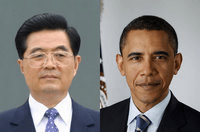BEIJING -- One of the issues President Barack Obama will inevitably discuss when he visits China next week is the deadlocked Six-Party Talks seeking to resolve the North Korean nuclear crisis.
Perhaps the most important difference between the 1994 Agreed Framework (.pdf), which settled the 1992-94 nuclear crisis, and the current Six-Party Talks is that the People's Republic of China (PRC) has been considerably more involved in supporting the latter process. Chinese policymakers initially promoted the Six-Party Talks primarily as a means of preventing Washington from adopting more coercive measures -- whether severe sanctions or military attacks -- toward the Democratic People's Republic of Korea (DPRK). Over time, the Chinese government has developed a stake in the talks' successful outcome as well as in maintaining a smooth negotiating process.
From Beijing's perspective, an enduring and comprehensive agreement within the Six-Party process would serve many interests. These include eliminating the problems that a North Korean nuclear arsenal would present for China; decreasing the threat of U.S. military intervention in a PRC border state; securing economic and other assistance for Pyongyang that could help avert DPRK state failure on China's doorstep; and helping to reinforce perceptions of Beijing as a committed and influential regional security stakeholder.

